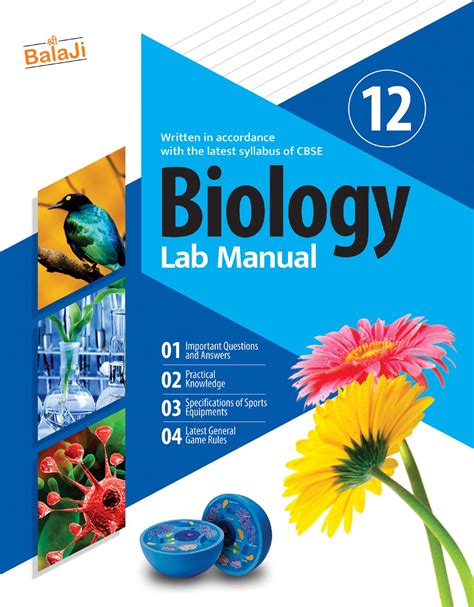Introduction

Delving into the fascinating world of biology demands a comprehensive and user-friendly laboratory manual. This article will explore the key components, applications, and benefits of a biology lab manual, providing you with an indispensable guide for your scientific endeavors.
What is a Biology Lab Manual?
A biology lab manual is a detailed guidebook that provides instructions and background information for conducting experiments in a laboratory setting. It typically includes:
- Step-by-step procedures for experiments
- Safety protocols and guidelines
- Background information on the theory behind the experiments
- Data collection and analysis methods
- Discussion questions and review materials
Why is a Biology Lab Manual Important?
- Enhanced Learning and Understanding: Lab manuals facilitate hands-on learning, allowing you to apply theoretical concepts in a practical setting.
- Safety and Compliance: They establish clear safety protocols, ensuring your well-being and compliance with laboratory regulations.
- Efficient Experimentation: Step-by-step instructions streamline experimentation, saving time and reducing errors.
- Data Analysis and Interpretation: Lab manuals provide guidance on data collection and analysis, empowering you to draw meaningful conclusions from your experiments.
Types of Biology Lab Manuals
- General Biology Manuals: Cover a broad range of topics, including cell biology, genetics, evolution, and physiology.
- Specialized Manuals: Focus on specific areas, such as microbiology, histology, or ecology.
- Virtual Manuals: Provide interactive simulations and virtual experiments for remote learning or supplement in-person labs.
Choosing the Right Biology Lab Manual
Consider the following factors when selecting a lab manual:
- Course requirements: Ensure the manual aligns with your course syllabus.
- Level of difficulty: Choose a manual appropriate for your knowledge and experience.
- Additional features: Look for manuals that include supplemental materials, such as videos, animations, or online resources.
Applications of Biology Lab Manuals
Lab manuals are not just confined to educational institutions. They also find applications in:
- Research and Development: Provide reliable protocols for conducting scientific experiments.
- Industry: Implement standardized procedures for quality control and product development.
- Environmental Monitoring: Guide monitoring and assessment of environmental parameters.
- Citizen Science: Empower citizens to participate in scientific research through simplified protocols.
Benefits of Using a Biology Lab Manual
- Improved Learning Outcomes: Engage in active learning, strengthen your understanding, and develop critical thinking skills.
- Increased Confidence: Gain hands-on experience and boost your confidence in conducting experiments.
- Time Efficiency: Streamline your experiments and save time by following clear instructions.
- Enhanced Safety: Prioritize your safety and minimize risks by adhering to established protocols.
- Data Integrity: Ensure the accuracy and reliability of your experimental data through standardized procedures.
FAQs
- Is a biology lab manual essential for my course? Yes, most biology courses require a lab manual to guide students through experiments.
- How often should I refer to my lab manual? During every lab session, consult your manual for instructions, safety guidelines, and data analysis methods.
- Can I use any lab manual for my course? Choose a lab manual recommended by your instructor or aligned with your course syllabus.
- What should I do if I don’t understand a procedure in the manual? Contact your instructor or a laboratory assistant for clarification.
- How can I make the most of my lab manual? Read it thoroughly before each lab session, take notes, and ask questions when needed.
- Are there online resources to supplement my lab manual? Many lab manuals provide access to online resources, such as videos, animations, and data analysis tools.
- What should I look for when choosing a lab manual? Consider the course requirements, level of difficulty, and the inclusion of supplemental materials.
- How can I use my lab manual beyond the classroom? Apply it to research projects, industry practices, environmental monitoring, or citizen science initiatives.
Conclusion
A biology lab manual is an indispensable tool for students, researchers, and professionals in the field of biology. It provides a comprehensive guide to conducting experiments, enhancing safety, fostering understanding, and ensuring data integrity. By leveraging the power of a biology lab manual, you can unlock the marvels of science and achieve your scientific aspirations.
